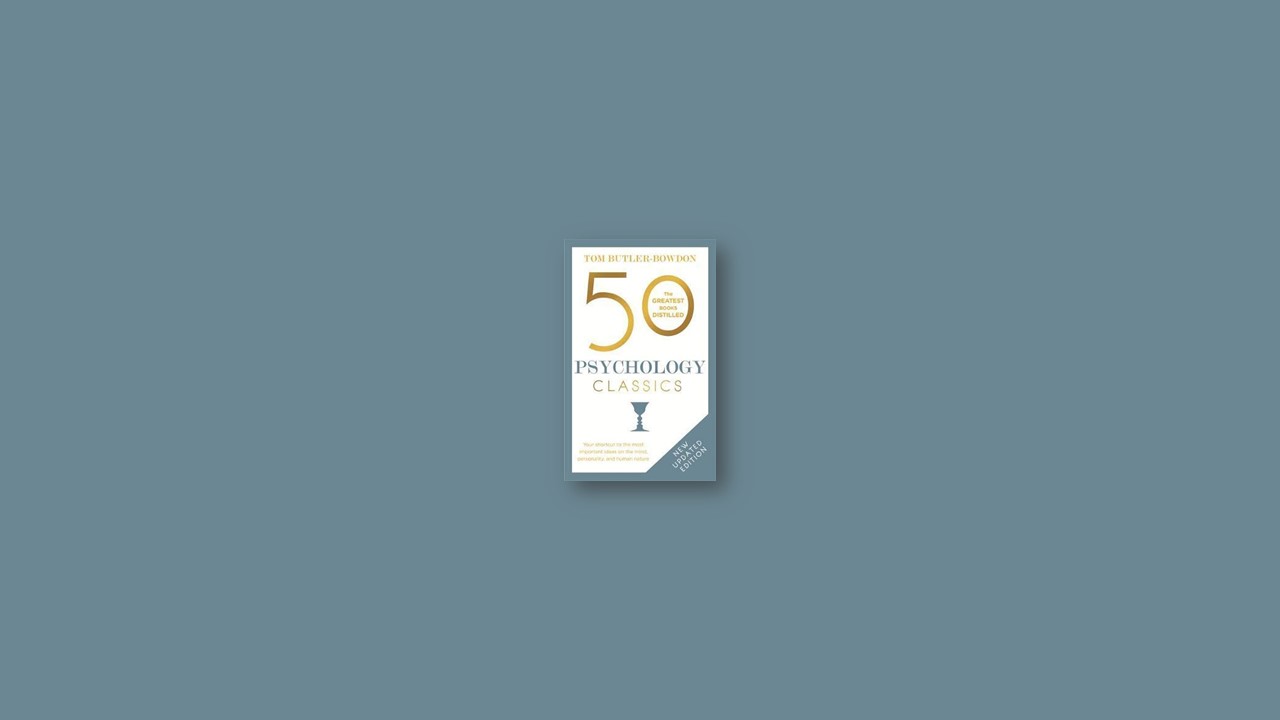1 Alfred Adler 1927 Understanding Human Nature
What we think we lack determines what we will become in life.
2 Gavin de Becker 1997 The Gift of Fear
Trust your intuition, rather than technology, to protect you from violence.
3 Eric Berne 1964 Games People Play
People play games as a substitute for real intimacy, and every game, however unpleasant, has a particular payoff for one or both players.
4 Robert Bolton 1979 People Skills
Good people skills not only get you what you want, they bring out the best in your relationships.
5 Edward de Bono 1970 Lateral Thinking
Learning how to think more effectively is not difficult and can dramatically improve our ingenuity in solving problems.
6 Nathaniel Branden 1969 The Psychology of Self-Esteem
Self-esteem occurs naturally when we choose to live according to reason and our own principles.
7 Isabel Briggs Myers 1980 Gifts Differing
If you know a person’s personality type their behavior begins to make sense.
8 Louann Brizendine 2006 The Female Brain
Men and women experience the world differently thanks to each gender’s vastly different exposure to sex hormones.
9 David D. Burns 1980 Feeling Good
Feelings are not facts; you can change your feelings by changing your thinking.
10 Robert Cialdini 1984 Influence
Know the techniques of psychological influence to avoid becoming their victim.
11 Mihaly Csikszentmihalyi 1996 Creativity
Real creativity can only emerge once we have mastered the medium or domain in which we work.
12 Albert Ellis & Robert A. Harper 1961 A Guide to Rational Living
If we know how we generate negative emotions through particular thoughts, especially irrational ones, we have the secret to never being desperately unhappy again.
13 Sidney Rosen 1982 My Voice Will Go With You: The Teaching Tales of Milton Erickson
The unconscious mind is a well of wise solutions and forgotten personal power.
14 Erik Erikson 1958 Young Man Luther
Crises of identity, while painful at the time, are necessary to forge a stronger, more commanding self.
15 Hans Eysenck 1947 Dimensions of Personality
All personalities can be measured according to two or three basic biologically determined dimensions.
16 Susan Forward 1997 Emotional Blackmail
We maintain our integrity only by withstanding other people’s controlling behavior.
17 Viktor Frankl 1969 The Will to Meaning
The conscious acceptance of suffering or fate can be transformed into one of our greatest achievements.
18 Anna Freud 1936 The Ego and the Mechanisms of Defence
We do just about anything to avoid pain and preserve a sense of self, and this compulsion often results in us creating psychological defenses.
19 Sigmund Freud 1900 The Interpretation of Dreams
Dreams reveal the desires of the unconscious mind, and its great intelligence.
20 Howard Gardner 1983 Frames of Mind
Many different forms of intelligence are not measured by IQ testing.
21 Daniel Gilbert 2006 Stumbling on Happiness
Due to way the brain works, our predictions of how we will feel in the future are not always accurate, and that includes what will make us happy.
22 Malcolm Gladwell 2005 Blink
Assessments we make in the blink of an eye can be as good as those we make after much deliberation.
23 Daniel Goleman 1998 Working with Emotional Intelligence
In the vast majority of fields, what makes a star performer is the ability to deploy exceptional emotional intelligence.
24 John M. Gottman 1999 The Seven Principles for Making Marriage Work
What makes a marriage or partnership strong is not such a mystery—psychological research provides answers if we care to look.
25 Harry Harlow 1958 The Nature of Love
Warm physical bonds in infancy are vital to our becoming healthy adults.
26 Thomas A. Harris 1967 I’m OK—You’re OK
If we become more conscious of our ingrained reactions and behavior patterns, our life can begin to be genuinely free.
27 Eric Hoffer 1951 The True Believer
People allow themselves to be swept up in larger causes in order to be freed of responsibility for their lives, and to escape the banality or misery of the present.
28 Karen Horney 1945 Our Inner Conflicts
The neurotic tendencies we may have acquired in childhood are no longer necessary—if we leave them behind we can fulfill our potential.
29 William James 1890 The Principles of Psychology
Psychology is the science of mental life, which means the science of the self.
30 Carl Jung 1968 The Archetypes and the Collective Unconscious
Our minds are connected to a deeper layer of consciousness that speaks in terms of imagery and myth.
31 Alfred Kinsey 1953 Sexual Behavior in the Human Female
There is a gap between the variety and extent of our sexual lives and what society or religion permits.
32 Melanie Klein 1957 Envy and Gratitude
How we cope with pain and pleasure as an infant can shape the basic life outlook we carry into adulthood.
33 R. D. Laing 1960 The Divided Self
We take a strong sense of self for granted, but if we don’t have this, life can be torture.
34 Abraham Maslow 1971 The Farther Reaches of Human Nature
Our view of human nature must expand to incorporate the features of the most advanced and fulfilled people among us.
35 Stanley Milgram 1974 Obedience to Authority
Awareness of our natural tendency to obey authority may lessen the chance of blindly following orders that go against our conscience.
36 Anne Moir & David Jessel 1989 Brainsex
By the time we emerge from the womb, most of the differences between males and females are already formed.
37 Ivan Pavlov 1927 Conditioned Reflexes
In the way that our minds are conditioned, we are less autonomous than we think.
38 Fritz Perls 1951 Gestalt Therapy
Be alive every minute in your physical world. Listen to your body; don’t live in abstractions.
39 Jean Piaget 1923 The Language and Thought of the Child
Children are not simply little adults, thinking less efficiently—they think differently
40 Steven Pinker 2002 The Blank Slate
Genetic science and evolutionary psychology show that human nature is not simply a result of socialization by our environment.
41 V. S. Ramachandran 1998 Phantoms in the Brain
Unraveling the weirder cases in neurology can provide insights into how we perceive ourselves.
42 Carl Rogers 1961 On Becoming a Person
A genuine relationship or interaction is one in which you are comfortable to be yourself, and in which the other person clearly sees your potential.
43 Oliver Sacks 1970 The Man Who Mistook His Wife for a Hat
The genius of the human brain is its continual creation of a sense of self, which persists even in the face of terrible neurological disease.
44 Barry Schwartz 2004 The Paradox of Choice
Paradoxically, happiness may lie in limiting our choices rather than increasing them.
45 Martin Seligman 2002 Authentic Happiness
Happiness has little to do with pleasure, and much to do with developing personal strengths and character.
46 Gail Sheehy 1976 Passages
What seem like very personal changes are often simply transitions from one season of life to another.
47 B. F. Skinner 1971 Beyond Freedom and Dignity
Like all animals, humans are creatures shaped by their environment—but we also have the ability to adjust or create new environments.
48 Douglas Stone, Bruce Patton, & Sheila Heen 1999 Difficult Conversations
Difficult conversations carry the chance to transform a relationship, but only if you shift your stance from delivering a message to discovering why the other person is acting as they are.
49 William Styron 1990 Darkness Visible
Depression can afflict anyone, and its causes are sometimes mysterious.
50 Robert E. Thayer 1996 The Origin of Everyday Moods
Given their effect on our quality of life, it is vital that we discover what may cause our moods.


